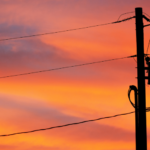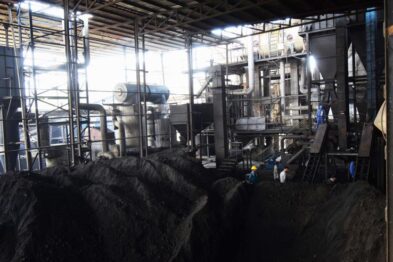Americans’ Attitudes and Actions on Climate Change
Belief in human-driven climate change declined overall, except among Republicans—driven by an increase in belief from Republicans under 45.
Though a majority of Democrats said they believed in human-driven climate change, while about a third of Republicans said the same, there is a notable increase in belief among Republicans. This is driven by Republicans under age 45. In 2017, 26 percent of both young and old Republicans believed in human-driven climate change. Now, while just 29 percent of Republicans over age 45 believe in it, that number is up to 42 percent of young Republicans.
After experiencing climate impacts, more Americans believe in human-driven climate change and the need for policy action
As Americans experience extreme climate events like hurricanes, droughts, floods, unusual temperatures and wildfires, their views on climate appear to change. About 9 in 10 who experienced extreme weather believe that climate change was a contributing factor, and about half think it was a major factor. Those who experienced extreme weather are also more likely to believe the federal government should combat climate change to stop extreme weather from getting worse, as well as to support regulations to reduce emissions and funding to help communities adapt to climate change. There was less division between the groups regarding whether the federal government should provide aid after a natural disaster. Despite recent cuts to the National Weather Service and its parent agency, the National Oceanic and Atmospheric Administration (NOAA), most Americans support the federal government tracking weather and warning of weather-related risks.
Climate change may spur some to move, as most Americans experience extreme climate events
Extreme climate events are mounting for Americans throughout the country. About three-quarters of Americans say they experienced unusually hot days this year. About 40 percent experienced severe storms, 35 percent experienced flooding, 32 percent experienced droughts and water shortages, and nearly a quarter experienced a wildfire. To avoid these extreme climate events, 21 percent of Americans say they would consider moving. About a third of those living in the West South Central region (Texas, Louisiana, Arkansas and Oklahoma) would consider moving, more than most other regions in the United States. About 20 percent of those in the Pacific region (Alaska, California, Hawaii, Oregon and Washington) would consider moving, after 60 percent said they experienced wildfires this past year.
Most Americans believe the federal government should respond to natural disasters, but few have confidence in agencies’ ability to do so
While about three-quarters of Americans believe the federal government should provide aid and help communities rebuild following a natural disaster, only about a quarter have confidence in the Federal Emergency Management Agency (FEMA) to respond to a natural disaster in their neighborhood. Strikingly, there was little difference in confidence between Democrats and Republicans, nor was there a significant difference between those who had experienced and hadn’t experienced extreme weather events. Americans have more confidence in the national weather service and local weather forecasters. Local first responders are held in the highest confidence from Americans.
Americans’ Views on Climate and Energy Policy
About half of Americans view climate and energy policy as very important
Healthcare and the economy rank the top issues Americans consider very important of the policies asked about on the poll. But energy policy and climate policy are nearly aligned with immigration in terms of importance to Americans. About half consider the three issues to be very important. There are large partisan divides on these three issues. Republicans are about twice as likely to consider immigration important (65 percent) as they are to consider climate change policy important (28 percent), while Democrats consider energy policy (60 percent) and climate change policy (69 percent) to be more important than immigration (48 percent).
Few Americans—including Republicans—support environmental rollbacks, while most support protecting our air, water and land
On Day One, President Trump withdrew the United States from the international Paris Climate Agreement and has since taken steps to roll back many environmental regulations. The poll found less than a quarter of Americans support withdrawal and rollbacks, with less than a third of Republicans saying the same. When asked if the government should take a more or less active role in global climate efforts and how important it is for the federal government to enforce stricter air and water regulations, Americans were more divided. Most Democrats wanted the government to take a more active role and viewed air and water regulations as very important. Less than half of Republicans wanted a more active role, and about half viewed the regulations as very important. There was the most agreement on the federal government conserving land and wildlife, with most Democrats and Republicans viewing this as very important.
Most Americans support policies that would reduce emissions, with a large partisan divide
Democrats overwhelmingly support climate policies, such as regulations to limit emissions from power plants and vehicles, incentives to purchase EVs, and funding to help states adapt—all policies recently rolled back by the Trump administration and Congressional Republicans. The majority of Republicans do not support these policies, with a 30- to 37-point divide between the two parties on these issues. There is no significant partisan divide on support for nuclear development—though that does not make it popular. Most Americans do not support incentives for nuclear energy, with just a 5-point divide between Democrats and Republicans. At the same time, more than half of Americans said it was extremely or very important for the federal government to expand the U.S. clean energy industry— including 73 percent of Democrats and 39 percent of Republicans.
Most Americans don’t support the expansion of fossil fuel development
The Trump administration has taken actions to expand fossil fuel development, including increasing drilling on federal lands and waters and expanding natural gas exports. The poll found that Democrats sharply oppose these efforts. While most Republicans support expanding oil and gas production and half say the same about expanding natural gas exports, significantly fewer support auctioning off more public land for oil drilling. Only 13 percent of young Republicans (18-29) support this, versus 42 percent of Republicans 60 and over. This is part of a wider trend of young Americans being less supportive of these actions, with 11 percent supporting auctioning more public lands for oil drilling (vs 23 percent of 60+).
There is a large divide between younger and older Republicans on climate and energy policies
Younger Republicans (18-29) disagree with their older counterparts (60+) on a wide variety of energy and climate policies. Generally, more younger Republicans think it is important to expand clean energy and support incentives for electric vehicles and funding to help communities adapt to climate change. The divide between younger and older Republicans on these issues ranges from a 16-point to a 21-point difference. This follows in line with the trend that an increasing share of younger Republicans believes in human-driven climate change. Conversely, older Republicans support the expansion of traditional fossil fuel energy. While 39 percent of young Republicans support expanding U.S. oil and gas production, 80 percent of older Republicans said the same—a 40-point difference. There was less divide over support for nuclear development.
Americans are not very willing to pay for climate action
While many Americans support climate policies, including a carbon tax on companies, they are much less supportive when it comes to paying for these policies in the form of a monthly fee on their energy use. In fact, less than half of Americans support paying any amount of money to combat climate change. Thirty-eight percent are willing to pay $1—falling from 52 percent in 2021. That said, a consistent minority is willing to pay a significant amount (even $100) to combat climate change.
Americans’ Views on Electric Vehicles
Few Americans own an electric vehicle, more than a third say they are likely to purchase one
While just 7 percent of Americans say they own an EV, 37 percent say they are at least somewhat likely to purchase one the next time they purchase a vehicle, and of the few who own one 78 percent say they are likely to buy another. Those under the age of 45 and those living in urban and suburban areas are more likely to own or lease an EV. They are also more likely to purchase an EV as their next vehicle, as are wealthier Americans. Americans in the West are more likely to purchase an EV (22 percent) than Americans from the Midwest (13 percent), South (16 percent) and Northeast (16 percent). And, while Republicans and Democrats own electric vehicles at similar rates, almost twice as many Democrats say they are likely to purchase one compared to Republicans.
Cost remains the top reason why Americans say they won’t buy an EV
While Congress and the Trump administration has ended tax incentives for EVs, more than half of Americans say such tax breaks would be motivation for buying one. This is the motivation where there is the least divide between Democrats and Republicans, with 25 percent of Democrats and 20 percent of Republicans listing tax breaks as a major reason to buy an EV. At the same time, 8 in 10 Americans say cost remains a top reason they won’t purchase an EV, consistent across income levels. Americans also list range limitations and charging time as top reasons why they won’t buy one. Regardless of whether respondents live in a rural, suburban, or urban area, about 6 in 10 say that a reason they wouldn’t purchase an EV is that they don’t know of charging stations nearby—this despite large investments in EV charging stations in recent years.
Most Americans would prefer an American EV over one from China, up to a point
Despite first the Biden administration and now the Trump administration imposing tariffs to make Chinese EVs more expensive and stave off competition, the poll showed most Americans aren’t interested in buying Chinese EVs in the first place. When told the Chinese version would be $500, $1,000, $2,000, cheaper than the American-made car, the majority still said they would pay more for the American car— they begin to waver at higher price differences of $5,000 or $10,000 and are less willing to pay more for American-made vehicles than they were in 2024. Republicans are more likely than Democrats to choose the American vehicle, though majorities of both parties still say they would buy American at some price differences. Seventy-nine percent of Republicans would buy American at the lowest price difference, versus 58 percent of Democrats. Americans over 45 were more likely than younger Americans to say they would buy US-made vehicles—77 percent of Americans 45+ versus 56 percent of Americans under 45 for the lowest price difference.
Americans’ Views on the Environmental Impact of AI
Americans are more concerned about the environmental impacts of AI than other threats
With data centers that power artificial intelligence (AI) expected to use a large amount of energy, the poll asked how concerned Americans are about the environmental impact of AI in comparison to other industries associated with emitting high amounts of greenhouse gases. It found most Americans (72 percent) are at least somewhat concerned about the environmental impact of AI, and 41 percent are at least very concerned. Those who graduated from college are more concerned about the environmental impacts of AI than those with no high school degree (45 percent vs. 25 percent). While Democrats are more concerned than Republicans across the industries polled, the area of most agreement was on AI—a 13-point difference.
Americans believe AI will do more to hurt than help society
About two in five Americans feel AI will do more to hurt than help society, while about a third feel similar feelings toward the impact on the economy and environment. Meanwhile, they are more divided on its impacts on them personally. Though there is not a large partisan divide, Democrats are more likely than Republicans to feel that AI will be more hurtful than helpful for the environment (37 percent vs. 28 percent), the U.S. economy (38 percent vs. 32 percent), and themselves personally (30 percent vs. 23 percent). As more data centers to power AI get built in rural areas, this has led to higher energy demands and utility costs, as well as reliability concerns, in these communities. Americans who live in rural areas were less likely than those who live in urban areas to think that AI will do more to help society at large (15 percent vs 25 percent), the environment (14 percent vs 21 percent), the economy (16 percent vs 26 percent), and themselves personally (15 percent vs 27 percent).














